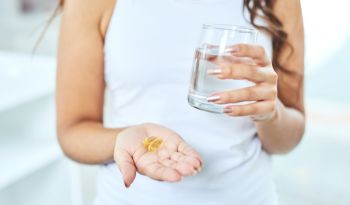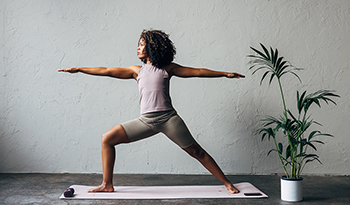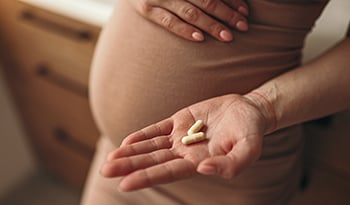Bästa Vitaminer För Kramper: Ett Djupdyk I Naturlig Lättnad

Om kramper kramar din stil — oavsett om det är mensvärk, benkramper eller täthet efter träningen — är du inte ensam. Dessa smärtsamma muskelsammandragningar kan smyga sig på dig under ett träningspass, på natten eller precis innan din period slår till.
De goda nyheterna? Rätt kombination av näringsämnen kan göra stor skillnad i både svårighetsgrad och frekvens av kramper. Oavsett om du är en löpare, en upptagen mamma, eller någon som bara försöker komma igenom sin cykel utan att vinka, den här är för dig.
Vad är kramper?
I sin kärna är kramper ofrivilliga, smärtsamma muskelsammandragningar som kan pågå allt från några sekunder till flera minuter. De är vanligast i benen, buken (som menskramper) och ben - men kan dyka upp nästan var som helst du har muskler.
Du har sannolikt upplevt en eller flera av dessa typer av kramper:
- Menstruationskramper: livmodern drar ihop sig när prostaglandiner stiger före och under din period
- Muskelkramper: utlöses av överanvändning, mineralförlust eller dålig hydrering
- Kramper i benen på natten: ofta orsakade av låga magnesium-, järn- eller kaliumnivåer, dessa kan smyga in medan du sover
Kramper är vanligtvis ett symptom på ett annat underliggande tillstånd, snarare än ett fristående problem. Din kropp säger att något är fel.
Symtom på kramper
Undrar hur kramper känns? Du kommer att känna dem när du känner dem. De vanligaste symptomen på kramper inkluderar:
- Plötslig täthet eller spasmer i en muskel
- Smärta när du försöker flytta eller sträcka en muskel
- Ihållande ömhet eller känslighet efter en krampepisod
Och när det är en menstruationskrampe? Förvänta dig smärta i nedre buken, ryggvärk och i vissa fall hänvisad smärta ner i benen. Du kommer ofta att märka att detta händer precis innan din period börjar eller under de första dagarna av din period.
Orsaker till kramper
Ofta, när vi upplever kramper, beror de inte på en enda orsak. Kramper härrör från en kombination av olika faktorer:
- Mineralbrist: brister i näringsämnen som magnesium, kalcium och kalium leder ofta till kramper
- Dehydrering: vätskeförlust kan orsaka elektrolytobalanser, vilket ökar risken för kramp
- Hormonförändringar: En minskning av östrogen före din period kan öka kramper via prostaglandiner
- Överanvändning eller ansträngning: Ett nytt träningspass eller en lång dag på fötterna kan dra åt musklerna
- Dålig tarmabsorption: När matsmältningen är avstängd kanske du inte absorberar tillräckligt med krampbekämpande näringsämnen
- Dålig cirkulation: Att stanna i en position för länge kan orsaka problem med cirkulationen som leder till kramper — att ha ett skrivbordsjobb, ligga i sängen hela dagen eller en stillasittande livsstil kan alla leda till kramper
Kramper och hormoner: Vad är länken?
Kramper under menstruationscykeln drivs av prostaglandiner — hormonliknande föreningar som utlöser livmodersammandragningar. När prostaglandiner är förhöjda (på grund av stress och inflammation) kan kramper kännas försvagande.
Låga magnesium- och kalciumnivåer kan också göra livmodern känsligare för dessa signaler. Och om ditt immunsystem och lever är belastade kan skiftande hormoner under hela din cykel utlösa symtom som kramper och smärta. Lågt progesteron eller förhöjt östrogen under andra halvan av din cykel (din lutealfas) kan göra kramper ännu värre.
Att hantera din mineralstatus och inflammatoriska belastning genom en balanserad kost, livsstilsförändringar och riktade tillskott kan avsevärt minska smärta i samband med kramper.
Vitaminer för kramper
Att äta en väl avrundad diet som ger alla viktiga näringsämnen kan hjälpa dig att må bäst och minska smärta från kramper. Om du hanterar frekventa muskel- eller menstruationskramper, fokusera på näringsämnena nedan, som är några av de mest effektiva för att minska frekvensen och intensiteten av kramper:
Kalium
Kalium, en av de vanligaste elektrolyterna i kroppen, finns i alla celler och kroppsvävnader. Det spelar en avgörande roll för att reglera vätskebalans och muskelsammandragningar. Att få tillräckligt med kalium genom mat eller kosttillskott kan hjälpa till att förhindra kramper på natten och efter träning.1
Detta essentiella mineral finns i en mängd olika växt- och animaliska livsmedel. Men de flesta av oss får inte tillräckligt av maten vi äter. Några av de bästa kaliumkällorna inkluderar:
Magnesium
Ett annat rikligt mineral i kroppen, magnesium är ett naturligt muskelavslappnande medel som stöder över 300 kroppsliga processer. Det är avgörande för kommunikation mellan nervceller, muskelsammandragningar och normala hjärtrytmer.2 Magnesiumtillskott kan vara särskilt effektivt för menstruationskramper och rastlösa bensyndrom.3,4
Magnesium finns i många livsmedel, men många av oss konsumerar inte tillräckligt:
- Pumpafrön
- Bladgrönsaker som spenat
- Nötter
- Mörk choklad
Kalcium
Medan vi ofta associerar kalcium med ben och tänder , samarbetar det också med magnesium för att reglera nerv- och muskelsignalering i hela kroppen. Låga kalciumnivåer har visat sig öka kramper och irritabilitet i samband med premenstruellt syndrom (PMS). 5
Utöver mjölk, yoghurt och ost, som alla är rika källor, finns kalcium i:
- Sardiner
- Bladgrönsaker som spenat och grönkål
- Tofu
- Mandlar
D-vitamin
Vitamin D, även känt som ”solskensvitaminet” eftersom vår bästa källa är exponering för solen, erbjuder en rad hälsofördelar och hjälper kroppen att absorbera kalcium och magnesium effektivt. Låga nivåer av D-vitamin kan vara förknippade med mer frekventa kramper och muskelsvaghet, även om forskningen är blandad.6
Få livsmedel är naturliga källor till vitamin D. Några av de bästa källorna inkluderar:
- Fet fisk som regnbåge och lax
- Svamp som har utsatts för UV-ljus
- Torskleverolja
- Förstärkt mjölk och spannmål
Zink
Zink hjälper till att förbättra immunfunktionen, stöder vävnadsreparation och kan hjälpa till att minska inflammation i kroppen. Det är avgörande för menstruationshälsa, eftersom det hjälper till att förhindra menskramper och hjälper till att läka muskelmikrotårar som leder till ömhet efter intensiv träning.7
Några av de bästa källorna till zink inkluderar:
- Ostron
- Kikärter
- Pumpafrön
B-vitaminer
De åtta B-vitaminerna är alla viktiga för hälsa och energimetabolism. Vitaminerna B1 (tiamin), B6 (pyridoxin) och B12 (cyanokobalamin) hjälper särskilt till att koordinera nerv- och muskelfunktionen. De stöder också humör och kan hjälpa till att minska PMS-symtom. Studier tyder på att vitamin B6-tillskott också kan stödja histaminresponsen i samband med PMS.8
B-vitaminer finns i en mängd olika livsmedel, inklusive:
- Ägg
- Fullkorn
- Näringsjäst
Hur man förhindrar kramper naturligt
Ibland dyker kramper fortfarande upp även om du äter bra. Här är några praktiska sätt att minska dem:
- Hydrat: drick minst 8 till 10 glas vatten dagligen
- Balansera elektrolyter: hydrera inte bara - tillsätt elektrolyter (särskilt efter träning)
- Stretch: stretching är särskilt viktigt före sängen och efter träning
- Blötlägg: prova Epsom saltbad för att lugna ömma muskler och öka magnesiumabsorptionen
- Fokusera på magnesium: ladda på magnesiumrika livsmedel som mörka bladgrönsaker, avokado och baljväxter
- Ta itu med stress: stresshormonet kortisol kan tömma kalium och magnesium
Din krampsäkra dagliga rutin
Om du ofta upplever muskel- eller menstruationskramper, följ dessa enkla tips för att anta en krampsäker rutin i din dagliga rytm:
- Ät en magnesiumrik frukost - tänk chiapudding, gröna eller havre - och drick elektrolytvatten hela dagen
- Ta 10 minuters promenadpaus hela dagen
- Stå upp och gör 10 knäböj var 60:e minut för att hålla cirkulationen uppe
- Blötlägg i ett Epsom-saltbad eller prova torr borstning för att stödja cirkulationen
- Sträck alltid före sängen och efter träning
När ska man träffa en läkare
De flesta kramper är ofarliga. Men om dina kramper regelbundet väcker dig på natten eller inte svarar på hydrering, kost eller kosttillskott, kan det vara värt en resa till läkaren. Svåra menstruationskramper som stör det dagliga livet kan vara ett tecken på endometrios eller fibroider och bör utvärderas av din vårdgivare.
Avhämtning
Kramper är kroppens sätt att säga, ”Hej, något är fel.” Oavsett om det är din mineralbalans, hydrering, stressbelastning eller hormonell hälsa, är dina kramper värda att lyssna på.
De goda nyheterna? Några riktade näringsämnen, dagliga vanor och stöd från en leverantör kan göra hela skillnaden. Anta en krampsäker daglig rutin för att lindra muskelkramper och periodsmärta och må bäst. Rådgör alltid med din vårdgivare innan du börjar ett nytt tillskott för att säkerställa att det är säkert för dig och inte kommer att interagera med några mediciner du tar.
Referenser:
- Kalium - Faktablad för hälso- och sjukvårdspersonal. Öppnade 24 juni 2025.
- Magnesium - Faktablad för hälso- och sjukvårdspersonal. Öppnade 24 juni 2025.
- Gonzalez-Parejo P, Martin-Nunez J, Cabrera-Martos I, Valencia MC. Effekter av kosttillskott hos patienter med rastlösa bensyndrom: En systematisk översyn. Näringsämnen. 2024; 16 (14).
- Parazzini F, Di Martino M, Pellegrino P. Magnesium i gynekologisk praxis: En litteraturöversikt. Magnes Res. 2017; 30 (1): 1-7.
- Siminiuc R, Turcanu D. Påverkan av näringsdietterapi på premenstruellt syndrom. Främre Nutr. 2023; 10.
- Weiker MK, Nielsen B, Waclawik AJ, Staples AC, Hansen KE. Muskelkramper förbättras inte med korrigering av vitamin D-insufficiens. FEBRUARI 2017; 116 (5) :200. Öppnade 24 juni 2025.
- Hsu TJ, Hsieh RH, Huang CH, m.fl. Effekt av zinktillskott vid hantering av primär dysmenorré: En systematisk granskning och metaanalys. Näringsämnen. 2024; 16 (23) :4116.
- Vitamin B6 - Faktablad för hälso- och sjukvårdspersonal. Öppnade 24 juni 2025.
ANSVARSFRISKRIVNING:Denna Wellness Hub avser inte att tillhandahålla diagnos ...
















































































 Innehållsförteckning
Innehållsförteckning















